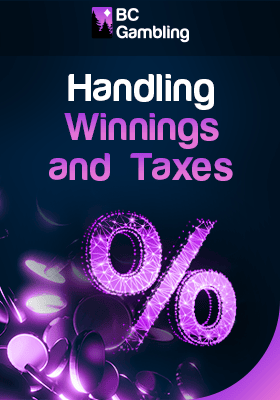Canadian Taxes on Gambling Winnings: A Guide for BC Players
In British Columbia (BC), the taxation on gambling winnings from both physical and online casinos is an important aspect of the gaming industry. This tax system affects everyone involved, from those who play occasionally for fun to those who gamble professionally for a living. It's important for anyone involved in gambling in BC to be aware of these tax details.

Understanding the Basics of Gambling Taxes in BC
In British Columbia (BC), both land-based and online gambling are significant, making it essential to understand the tax implications of casino winnings. The taxation of gambling winnings varies, affecting both casual and professional gamblers in BC.
The Concept of Gambling Taxation
Gambling taxes are a vital revenue source for BC's government, supporting healthcare, education, and community programs. In the fiscal year 2021/22, the British Columbia Lottery Corporation (BCLC) contributed $1.314 billion in net income to provincial and federal governments, part of over $26 billion generated since 1985.
Different Types of Gambling Taxes
In British Columbia, gambling winnings are generally not subject to taxation. This is because the Canadian Revenue Agency (CRA) does not consider gambling winnings to be a constant source of income, instead categorizing them as activities. Here are some specifics regarding taxation and gambling that residents should be aware of:
- Professional Gamblers: If a person gambles professionally, it means they run their gambling activities as a business. Their winnings are considered business income and are therefore taxable. Professional gamblers can also claim their losses and expenses as business deductions.
- Lottery Winnings: Regular lottery winnings are not taxed in Canada. Whether it’s a one-time jackpot or a smaller prize from a variety of lottery games available in the province, these amounts are not subject to tax.
- Casino Winnings: Similar to lottery winnings, money won from a casino is not taxed at the point of winning. However, casinos and gaming operators in the province are taxed and regulated by the government.
- Sports Betting: Winnings from sports betting are treated the same way as casino and lottery winnings. No tax is charged on the winnings unless you are considered a professional gambler.
- Interest on Winnings: While the initial winnings are not taxed, any interest earned on those winnings, such as from a bank account or investment, is taxable as income.
- Gambling Taxes for Operators: The government of British Columbia collects taxes from licensed gambling operators in the province. This includes taxes on revenue from slot machines, table games, and other gaming activities.
- Charitable Gaming Taxes: Charitable organizations that conduct gambling events, like bingo or raffles, must ensure they comply with specific licensing and taxation rules set forth by the British Columbia government.
- Horse Racing: Winnings from betting on horse racing are not taxed. However, the industry itself is subject to government regulations and taxes.
The government uses revenue from gambling taxes and licensing fees to fund various public services, including healthcare, education, and community programs. It's essential for anyone engaging in gambling activities to understand the potential tax implications, particularly if their circumstances might categorize them as professional gamblers.
Allocation of Collected Funds
Funds from gambling in BC are allocated to various sectors, including $147.2 million to healthcare, $139.8 million to charitable and community organizations, and $91.2 million for First Nations Revenue Sharing, among others, in the fiscal year 2021/22.
Taxation on Casino Winnings vs Professional Gambling Income
In Canada, recreational gambling winnings are typically not taxable, while professional gambling earnings are taxable as business income. The Canada Revenue Agency considers factors like the organization of gambling activities for profit, frequency of gambling, and reliance on gambling for livelihood. Professional gamblers can also deduct game-related expenses.

British Columbia Casino Gambling Regulations
In Canada, particularly in British Columbia (BC), understanding casino gambling regulations is crucial. The country's approach integrates federal and provincial governance, with BC being a prime example of managing both land-based and online casinos.
Overview of Canadian Gambling Laws
Canadian gambling regulations are characterized by a dual operator-regulator role of regional authorities. Key aspects of these legislations are:
- Protecting the public from gambling's adverse effects.
- Defining liability in gambling.
- Setting standards for gambling venues and permissible slot machines.
- Establishing financial rules for the gambling industry.
- Ensuring strict surveillance and security measures in gambling establishments.
Regulation of Horse Racing
The Federal Department of Agriculture, through the Canadian Pari-Mutuel Agency (CPMA), governs horse racing in Canada, providing a stable legal framework for the sport.
Provincial Lottery Commissions
Provincial lottery commissions, like the Western Canada Lottery Corporation and the British Columbia Lottery Corporation (BCLC), play a vital role. For instance, the BCLC allocated $91.2 million to BC's First Nations in fiscal 2021/22 through the BC First Nations Revenue Sharing Agreement.
Provincial Role in Gambling Regulation
Canada's decentralized model allows provinces to tailor gambling regulations. The Criminal Code of Canada sets the legality parameters, while provinces have jurisdiction over land-based and online betting activities.
- BC's local governments hosting casinos receive ten percent of net revenue, with the BCLC contributing $1.4 billion in net income to the province in fiscal 2018/19.
- During the COVID-19 pandemic, the BCLC reported $1,314 million in net income, supporting the province through challenging times.
BC's Casino and Gambling Activity Management
The Gaming Policy and Enforcement Branch under BC's Ministry of Finance supervises betting service providers, based on the Gaming Control Act of 2002. Like Alberta, BC endorses a single regulated online platform, PlayNow.
- BC is transitioning its oversight to the Independent Gambling Control Office (IGCO), focusing on a broader regulatory scope, including responsible gambling practices.
- The BCLC enhances lottery system integrity, ensuring comprehensive retailer certification and training, with meticulous assessments by its Corporate Security division.
- BC offers 36 casinos and gaming hubs, featuring a mix of games, dining, and entertainment options.

Taxation on BC Casino Operators
In British Columbia (BC), casino operators' contributions to government revenue are significant, especially considering the mix of land-based and online gambling platforms. This section focuses on the tax structure for BC casino operators and their impact on provincial revenue.
The Structure of Casino Taxation in BC
Canadian gambling winnings, including those in BC, are generally not directly taxed. However, interest earned on these winnings is taxable. BC employs a bracketed income tax system, with rates ranging from 5.06% to 20.50%.

BCLC's Revenue Breakdown
In 2020, the British Columbia Lottery Corporation (BCLC) reported revenues of 2.53 billion Canadian dollars, with over 1.83 billion from the "Casino & Community Gaming" sector. The 2020-2021 fiscal year saw a decrease to CAD$965.6m due to the pandemic, impacting land-based casino operations.

Growth in Canadian Online and Lottery Sectors
During the pandemic, BCLC's online platform, PlayNow.com, saw a revenue increase of 135.4% to $421.4m, while lottery revenue rose by 4.7% to $544.0m.

Financial Overview
BCLC reported annual expenses of $494.0m and a pre-tax net income of $471.6m, marking a decline from the previous year. The final net income after taxes was $429.9m.
BC's Casino Taxation Model
BC's unique model allocates a major share of slot machine revenue to the government, approximately 75%, while table game profits see the government taking around 65%. This contrasts with regions like Nevada, which reported lower tax revenue despite a lower tax rate.
BC's Casino Revenue Contributions
In BC, the gaming sector contributes over $3 billion to the GDP, with casinos contributing around $1.9 billion annually. The sector supports about 37,000 jobs. For 2019-20, total revenue was $2.5 billion, with $1.3 billion directed to the BC government.

Tax Exemptions and Special Cases
Understanding tax exemptions and obligations for both casual and professional gamblers is crucial in the context of gambling taxes in British Columbia (BC) and wider Canadian gambling taxation.
Tax Exemptions for Casual Gamblers
In BC, casual gamblers enjoy tax-free winnings. This exemption applies regardless of the amount won and reflects Canada's view of gambling winnings as windfalls. However, the proportion of gamblers benefiting from this exemption in BC is not clearly defined.
Tax Obligations for BC Professional Gamblers
Professional gamblers in BC face a different tax scenario. They must report their winnings and are allowed to deduct losses and expenses. Non-compliance can lead to penalties. The Canada Revenue Agency (CRA) generally audits professionals less, with tax rates on winnings ranging from 15% to 33%.
- Cross-border Tax Implications: Winnings from gambling in countries like the U.S. can attract a 30% tax, but Canadians may apply for a tax refund, subject to specific conditions and documentation.
- Uncertainty in Professional Gambler Numbers: The exact number of professional gamblers registered for taxes in BC remains unclear.
Handling Taxation on Gambling Prizes and Gifts
Gambling earnings can also include non-monetary rewards or gifts, each with distinct tax implications.

Windfalls and Taxation
Lottery and sweepstakes prizes are tax-exempt, but income generated from these winnings, like bank interest or stock dividends, is taxable.

Investing Winnings
Investing gambling winnings in Tax Free Savings Accounts (TFSA) or Registered Retirement Savings Plans (RRSP) can offer tax benefits.

Casino Prizes and the CRA
Substantial casino prizes are usually treated as tax-free, similar to lottery rewards. However, the CRA increasingly scrutinizes professional gamblers, categorizing their earnings as business income.

Impact of Gambling Taxes on the BC Gaming Industry
The interplay between taxation and the gaming industry is crucial in determining how casinos operate, the types of games they offer, and their broader societal contributions. In British Columbia (BC), gambling taxes significantly impact these aspects of the gaming industry.
How Taxes Affect Casino Revenues and Payouts
In BC, around two-thirds of gross gaming revenue from casinos is directed to the provincial government, funding essential public services. The remaining revenue is allocated to service providers, covering expenses like wages, infrastructure, and operational costs.
Player Experience and Payout Dynamics
This revenue split influences the player experience, particularly in payouts. BC casinos typically redistribute over 92% of slot machine credits back to players as rewards, though this doesn't guarantee a 92% return on each individual bet.
The Relationship Between Taxes and Responsible Gambling Measures
Revenue from gambling taxes funds responsible gambling initiatives. This includes events like the New Horizons in Responsible Gambling conference in Vancouver. Tax revenue is used for:
- Raising responsible gambling awareness
- Funding research
- Hosting international gambling experts
Despite this, balancing revenue generation and responsible gambling remains a complex issue, requiring transparent collaboration among all stakeholders.
Comparing BC's Gambling Taxes with Other Provinces or Countries
Tax structures in the gambling industry vary across regions. In Canada, professional gamblers and those earning interest on winnings are required to declare this income. Provincial tax rates on gaming earnings include:
- Ontario: Varying rates from 5.05% to 13.16%.
- Quebec: A 14% rate on incomes up to $49,275.
- Alberta: A flat 10% tax on incomes up to $142,292.
- Manitoba: Rates from 10.80% to 17.40%.
- Saskatchewan: 10.50% tax for incomes up to $49,720.
- Nova Scotia: Ranging from 8.79% to 21%.
- New Brunswick: Starting at 9.4%, up to 19.5%.
- Prince Edward Island: Tax rates between 9.8% and 16.7%.
- Newfoundland and Labrador: From 8.7% to 21.8%.
- British Columbia: BC's model stands out for its use of gaming taxes to support public services and responsible gaming, balancing economic benefits with societal well-being.

Tips for Managing Gambling Winnings and Taxes in BC
Effectively managing gambling winnings and understanding tax obligations in British Columbia (BC) is crucial for gamblers. Here are essential tips for players in BC:
Keeping Accurate Records of Gambling Activities
Maintaining detailed records of gambling activities is vital. Accurate records help:
- Verify the taxability of winnings.
- Prevent legal issues due to lack of documentation.
- Make informed financial decisions based on gambling history.
Though specific data on the percentage of BC gamblers who keep detailed records is not available, it's clear that proper documentation can prevent legal complications and aid in tax management.
Seeking Professional Tax Advice for Gamblers
Given the complexities of gambling taxes, professional advice is beneficial for both professional and casual gamblers. Consulting a tax expert helps in:
- Distinguishing between recreational and professional gambling.
- Understanding the potential to deduct gambling losses.
- Complying with tax regulations to avoid issues.
While the exact percentage of BC gamblers consulting tax professionals is not known, the intricacies of gambling taxes make professional guidance valuable.
Understanding Potential Penalties for Tax Non-Compliance
Being aware of penalties for tax non-compliance is essential:
- First conviction fines range from $200 to $500.
- Subsequent convictions can result in fines from $500 to $2,000.
While specific data on tax audits in BC's gambling sector is unavailable, these penalties underscore the importance of adhering to tax regulations.
Conclusion
In summary, the taxation system for gambling in British Columbia (BC) is a multifaceted aspect that significantly influences the gaming industry and its participants. The varied tax implications for both casual and professional gamblers underscore the importance of understanding and adhering to these financial obligations. As the province continues to leverage these taxes for public services and responsible gaming initiatives, the balance between economic growth and social responsibility remains a key consideration in BC's approach to managing its thriving gambling sector.
FAQ
- What are the tax rates for different types of gambling in BC? In BC, recreational gamblers typically don't pay taxes on winnings, while professional gamblers pay regular income tax rates.
- Are casino operators responsible for withholding taxes on winnings? No, casino operators in BC are not typically responsible for withholding taxes on recreational gambling winnings.
- Can I claim deductions for gambling losses on my tax return? If you're classified as a professional gambler, you may claim deductions for gambling losses against your winnings.
- How do I report gambling income as a professional gambler in BC? Professional gamblers in BC should report their net income (wins minus losses) on their annual tax return as business income.
- What are the potential consequences of not paying gambling taxes in British Columbia? Failing to pay gambling taxes in BC can result in financial penalties and potential legal consequences.